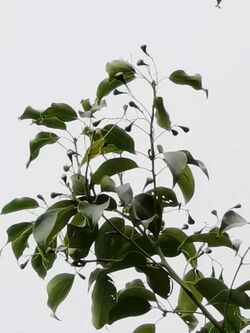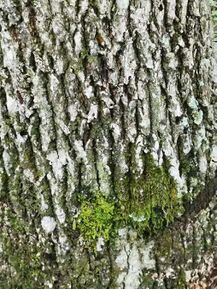Biology:Cinnamomum kanehirae
| Cinnamomum kanehirae | |
|---|---|

| |
| Scientific classification | |
| Kingdom: | Plantae |
| Clade: | Tracheophytes |
| Clade: | Angiosperms |
| Clade: | Magnoliids |
| Order: | Laurales |
| Family: | Lauraceae |
| Genus: | Cinnamomum |
| Species: | C. kanehirae
|
| Binomial name | |
| Cinnamomum kanehirae (Hayata) Hayata
| |
Cinnamomum kanehirae (Chinese name niu zhang(牛樟)), also known as small-flowered camphor tree, or stout camphor tree, is a tree within the genus Cinnamomum of the family Lauraceae endemic to Taiwan.
Characteristics
The tree can grow up to 30 m tall, 2 m across; evergreen trees; bark brown, fissured; branchlets glabrous, and yellow-green in color; leaves alternate, coriaceous, entire, margins often wavy, broadly ovate, ovate to elliptic, polished, 10–15 cm long, 4–7.5 cm wide, green and glabrous on both sides, usually with 0–3 or often 5 main veins, rarely with pinnate veins, lateral veins 2–3 pairs, short acute at apex, obtuse-rounded at base; petioles 1.4–3 cm long, grooved above. Inflorescences cymes, terminal; bracts of flowers pubescent outside, 2–3 mm across; perianth 6, pale-yellow, oblong, 2 mm long, tomentose at base inside, 1st and 2nd whorls of stamens 0.5 mm long, tomentose at base inside, anthers 4-celled, eglandular, introrse, 3rd whorl of stamens with glands, tomentose at base inside, anthers 4-celled, extrorse. Berry compressed-obconic or globose, l.2-1.3 cm long, l.2-1.5 cm across, green to blackish-violet, slightly pubescent to glabrous; seeds globose, 1 cm across, rounded on both sides. Flowering Nov. to December.; Fruiting Sept. to October.[1][2][3]
Habitat
This species is present at 200–2,000 m, mixed with C. micranthum in broad-leaved forests throughout Taiwan.[1][2]
Uses
It commonly used in carving or manufacturing equipments, and sometimes used in furniture; branches and leaves can also be distilled and obtained wood essential oils.[1][2]
Gallery
References
- ↑ 1.0 1.1 1.2 LlAO, JIH CHING (1996). 27. LAURACEAE. Flora of Taiwan, second edition..
- ↑ 2.0 2.1 2.2 "Herbarium of National Taiwan University. 2012. Plant of Taiwan.". http://tai2.ntu.edu.tw/.
- ↑ Wu, Chia-Chen; Ho, Cheng-Kuen; Chang, Shu-Hwa (July 2016). "The complete chloroplast genome of Cinnamomum kanehirae Hayata (Lauraceae)". Mitochondrial DNA Part A 27 (4): 2681–2682. doi:10.3109/19401736.2015.1043541. ISSN 2470-1408. PMID 26053940.
Wikidata ☰ Q15252180 entry
 |






